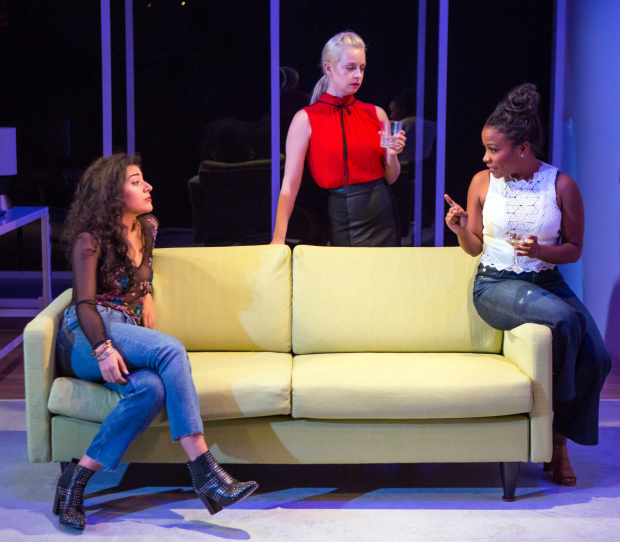Ultimate Beauty Bible

(© Jeremy Daniel)
Three best friends are editors of beauty, accessories, and lifestyle at Crimp Magazine. One of them is diagnosed with a life-threatening illness. Throw in the title of Caroline V. McGraw's new play with Page 73 — Ultimate Beauty Bible — and these ingredients point to a trite tale of thirtysomethings reprioritizing their superficial existences as they discover that work isn't everything and beauty is only skin deep. Goes to show you can't always judge a book by its misleading cover, as McGraw offers a much more satisfyingly complex array of characters, relationships, and musings on life than you'd be likely to find in an issue of Crimp.
For once, the appearance-obsessed world of cosmetics is not necessarily the enemy. Danielle (a commanding Eboni Booth), the central protagonist and bearer of the distressing health news, takes a particularly spiritual view of her industry. "The compacts and the tubes, they’re tiny promises," she says. "When you open this eyeshadow, when you put on this nail polish, something extraordinary will happen."
These shimmering tubes of control similarly appeal to her girlfriends and fellow Crimp professionals: Tiffany (played by the sharp-tongued Ariel Woodiwiss), a razor-edged fashionista who appears to strictly abide by every beauty tip, and Danielle's roommate Lee (embodied by Nadine Malouf with effortless magnetic energy), a freewheeling bohemian who rarely thinks beyond the night's activities.
A promise of the "extraordinary," however, is particularly valuable to Danielle in the wake of recent events, and she fittingly delivers her philosophical speech on the subject during a carpe diem night on the town. Her audience of one at a bar is a stranger named Kit, who, for a while, seems to answer her prayers for companionship. He surely looks the part, dressed in the untethered nice-guy uniform of a flannel, T-shirt, and jeans (a recognizable ensemble designed by Sarah Laux to contrast the fashion-forward outfits she gives to the women). Alex Breaux plays the part of Kit with an understated and soothing presence. However, just like eyeshadow and nail polish, Kit's perfect "boyfriendy" exterior starts to erode and reveal who he really is rather than who he wishes he were.
McGraw draws interesting comparisons between the inner conflict we see in Kit and her three looks-conscious women — questioning whether people can in fact change from the outside in, or whether our outsides merely mask what's underneath. Despite this central motif, Danielle, Lee, and Tiffany's exterior-driven lives at Crimp end up playing a surprisingly minor role in the narrative. The most time we spend at Crimp (a sleek, angular space designed by Daniel Zimmerman) is with a mysterious character named Autumn (Molly Griggs), a former intern-turned-editorial-assistant who delivers a series of four monologues directly to the audience. Griggs is a compelling narrator for these allegorical tales, which accentuate the play's main themes, but they're jarring interludes that shift the tone from a traditional narrative — established early on by director Stephen Brackett — to something less settled in reality.
And there are more than enough threads to keep us occupied in reality. There's the increasingly complicated relationship between Danielle and Lee as the best friends (and essentially life partners) consider the possibility of an impending separation (Booth and Malouf conveying a touching chemistry). There's the illicit relationship that buds between Lee and Kit. And then there's the unorthodox phone flirtation that Danielle develops with Seth, the call center receptionist at her health insurance company. Played with an aura of unadulterated goodness by Sathya Sridharan, Seth espouses a "live for today" philosophy — another mantra that McGraw effectively debunks, or at least questions, as we see Danielle discover how precious the luxury of living for tomorrow can be.
McGraw gives us plenty of material to chew on, but it's difficult to pinpoint how all these characters and ideas jell into a cohesive thesis. There are lots of questions, mercifully few attempts at answers, and a few head-scratching moments when you wonder how this all relates to something titled Ultimate Beauty Bible. Still, even if slightly mismatched, the play is both written and performed vividly enough to compel a deep investment in every clashing color.











